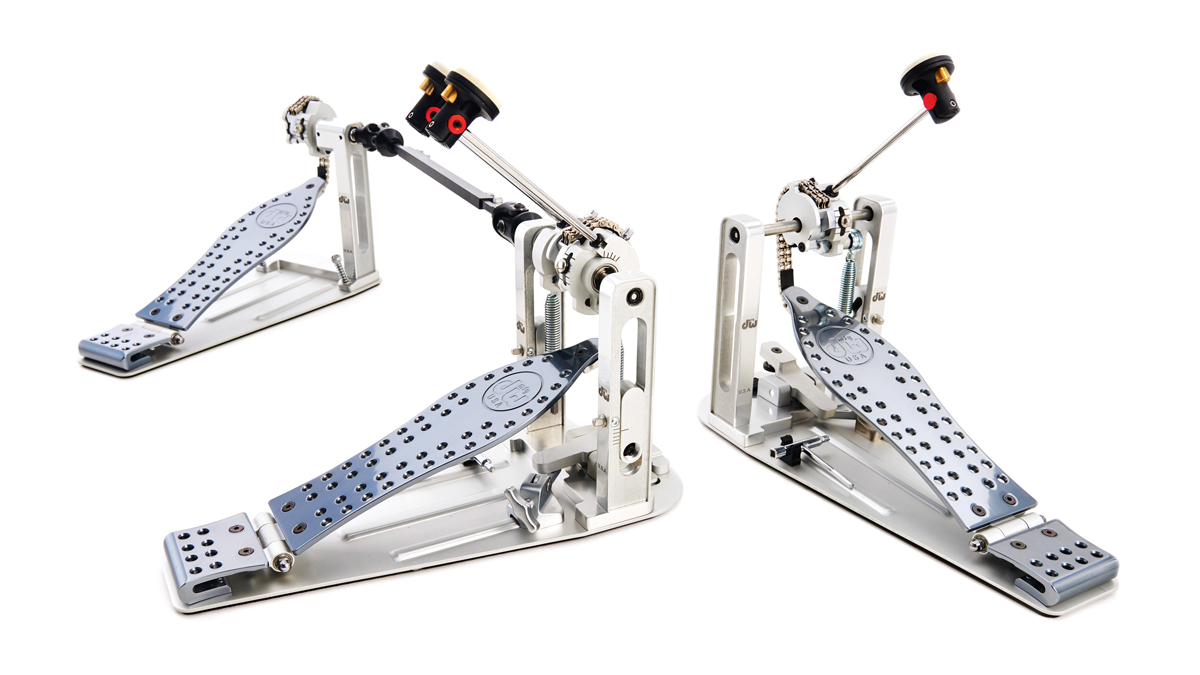MusicRadar Verdict
For those with money to spend and an attraction to hi-tech, multiple-adjustment pedals, DW’s Machined Chain Drive single and double models are cutting-edge instruments with smooth and silent operation.
Pros
- +
Incredible build.
Cons
- -
Expensive.
MusicRadar's got your back
This writer's neighbour, a classical violinist, once said she’d just bought a vintage violin bow.
“It’s just a cheap one but miles better than my old one,” she gushed. How much then? “Oh, only £6,000.”
We mention this because sometimes we drummers don’t know how lucky we are. A £1,000 street price for a double pedal may be pie-in-the-sky for most but, let’s face it, you get a whole lot more than a stick of wood strung with horse hair!
Build
The Machined Chain Drive (MCD) pedal is the product of DW’s MFG (manufacturing) lab where they experiment to push drumming-world boundaries. The first MFG product was the MDD (Machined Direct Drive) pedal. That pedal had a direct link drive whereas this one substitutes DW’s more familiar double chain.
Not only that, but the chain loops over an adjustable, sprocket-less cam that incorporates a ‘gear shift-style’ lever, “allowing players to quickly shift between the most popular chain-drive cam settings”.
But this is just one of a raft of features, all working separately so they don’t clash with or eliminate one another. It’s a monster alright, but as it’s largely built from aircraft grade aluminium it stays within the realms of transportable. If it was all steel you’d have a job picking it up! By the way, the pedals come with handy tailor-made fabric carrying cases.
Hands On
The first thing we did was to give the footboard a shove with our hand and count the number of swings before it came to rest. The average was 33, which speaks volumes for the smooth bearings and easy action.
Want all the hottest music and gear news, reviews, deals, features and more, direct to your inbox? Sign up here.
Clamping the pedal to the bass drum, the rubber gripping base plate slips under your hoop and is tightened from the side, where you can easily reach it. The Tri-Pivot Swivel Toe Clamp itself has a clever rocking design that allows for uneven surfaces or for clamping off-centre without stressing your hoop.
Sliding your foot luxuriously onto the footplate, you’re reminded of the one in your Ferrari (ahem), a smooth lump of Formula One polished cast aluminium with perforated holes for grip if needed.
The beater head has three different faces - flat or curved felt, and hard plastic - which are easily interchangeable by unscrewing them by hand
So onto the adjustments. The ‘110 Control’ beater head rotates in a vertical plane on its own rod axis. You can adjust it to the exact angle to strike your batter skin flat on - then secure it using the special multi-tool, which is docked in the base plate.
The beater head has three different faces - flat or curved felt, and hard plastic - which are easily interchangeable by unscrewing them by hand. This reveals a sort of six-shooter (well, four-shooter) barrel, into which you slot or remove the ‘bullets’, ie: the small brass weights that help you to find your optimum beater-head thump.
The massive vertical support posts are hollowed out and the right one houses the rather ingenious VERT Vertical Spring Adjustment Tensioner. Instead of having to manhandle a locking nut while simultaneously stretching the spring (as you do on nearly all other pedals) you use your drum key to rotate an adjustment nut. This stretches out the spring till you reach the desired tension. It’s calibrated too. Clever or fussy? We’d say clever.
The cam itself is sprocket-less and has what DW describes as a ‘gear shift-style lever’
As always, the business end rotates around a horizontal spindle. But here comes the next innovation, which DW terms Floating Rotor Technology. Eerily, this spindle is not clamped to the cam, but is completely free, so the cam and double chain ride on it without being fixed to it. The effect of this is to make your beats feel even more friction-free as well as totally silent.
The cam itself is sprocket-less and has what DW describes as a ‘gear shift-style lever’. This takes the form of a cute little protruding nose on the cam casting that you can push up or down, thus moving between a circular, direct cam drive and five close calibrations of oval, accelerator cam drive.
We can’t say how all this causes the new pedal to differ from the earlier DDM as we don’t have one for comparison. But suffice to say that the MCD has a silent and free, smooth-gliding, effortless stroke, as good or better than any previous DW pedal. Which is high praise indeed.
As reported in the earlier review, the slave pedal is perfectly matched allowing accurately balanced double-kick playing. The two pedals play as one: enough said!

Geoff Nicholls is a musician, journalist, author and lecturer based in London. He co-wrote, co-presented and played drums on both series of ‘Rockschool’ for BBC2 in the 1980s. Before that he was a member of original bands signed by Decca, RCA, EMI and more. ‘Rockschool’ led to a parallel career writing articles for many publications, from the Guardian to Mojo, but most notably Rhythm magazine, for which he was the longest serving and most diverse contributor.
